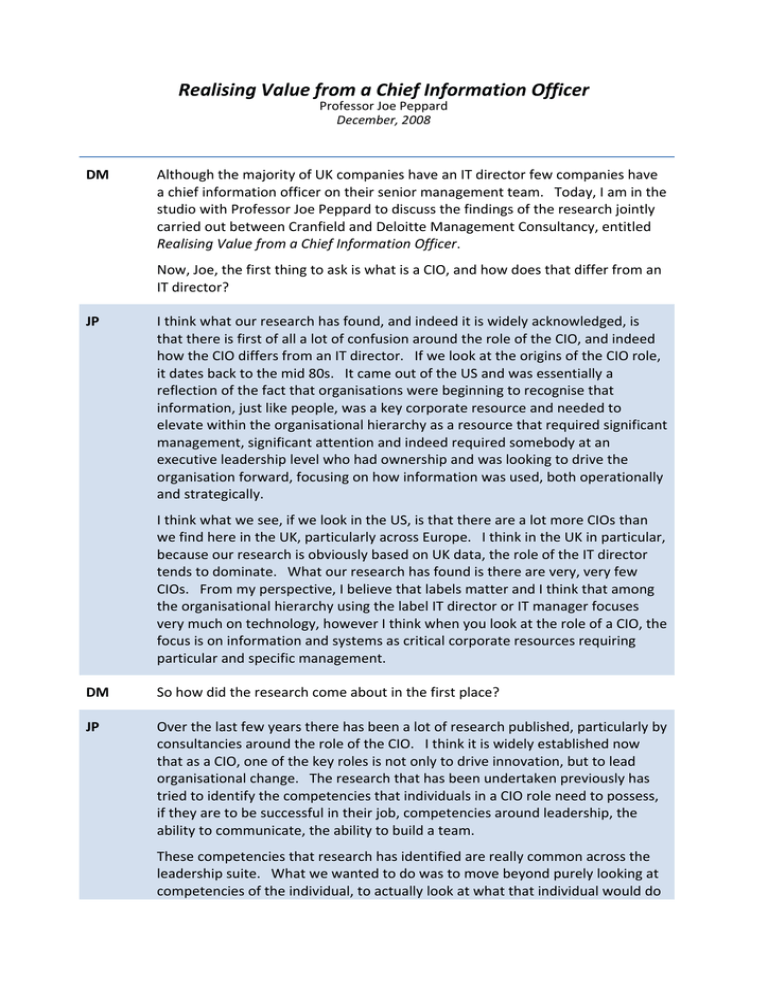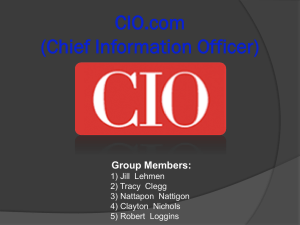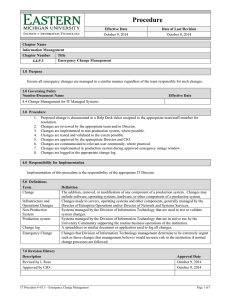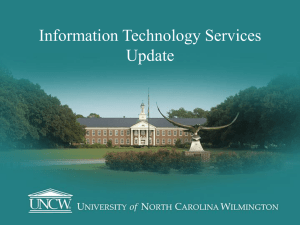Realising Value from a Chief Information Officer
advertisement

Realising Value from a Chief Information Officer Professor Joe Peppard December, 2008 DM Although the majority of UK companies have an IT director few companies have a chief information officer on their senior management team. Today, I am in the studio with Professor Joe Peppard to discuss the findings of the research jointly carried out between Cranfield and Deloitte Management Consultancy, entitled Realising Value from a Chief Information Officer. Now, Joe, the first thing to ask is what is a CIO, and how does that differ from an IT director? JP I think what our research has found, and indeed it is widely acknowledged, is that there is first of all a lot of confusion around the role of the CIO, and indeed how the CIO differs from an IT director. If we look at the origins of the CIO role, it dates back to the mid 80s. It came out of the US and was essentially a reflection of the fact that organisations were beginning to recognise that information, just like people, was a key corporate resource and needed to elevate within the organisational hierarchy as a resource that required significant management, significant attention and indeed required somebody at an executive leadership level who had ownership and was looking to drive the organisation forward, focusing on how information was used, both operationally and strategically. I think what we see, if we look in the US, is that there are a lot more CIOs than we find here in the UK, particularly across Europe. I think in the UK in particular, because our research is obviously based on UK data, the role of the IT director tends to dominate. What our research has found is there are very, very few CIOs. From my perspective, I believe that labels matter and I think that among the organisational hierarchy using the label IT director or IT manager focuses very much on technology, however I think when you look at the role of a CIO, the focus is on information and systems as critical corporate resources requiring particular and specific management. DM So how did the research come about in the first place? JP Over the last few years there has been a lot of research published, particularly by consultancies around the role of the CIO. I think it is widely established now that as a CIO, one of the key roles is not only to drive innovation, but to lead organisational change. The research that has been undertaken previously has tried to identify the competencies that individuals in a CIO role need to possess, if they are to be successful in their job, competencies around leadership, the ability to communicate, the ability to build a team. These competencies that research has identified are really common across the leadership suite. What we wanted to do was to move beyond purely looking at competencies of the individual, to actually look at what that individual would do in an organisation, because, when we started out on the research our feeling was that, depending on the operating model of the organisation, the role and requirement of the CIO would be quite different. DM Now I noticed that you said in the report, that there is no one size fits all CIO and that you identified five states of information and technology leadership – only three of which require a CIO. Can you explain that in a bit more detail? JP Absolutely. If we look at the operating model that a company has in place, at one extreme there is a sole requirement to provide information and comms for the business. The role of managing information, systems and technology is not seen as strategic, and therefore we believe our data is showing is that if that is the role, all that is required is essentially an IT director – somebody with the technical skills and competencies to ensure that the required infrastructure and comms are actually delivered. So essentially, the key role of that IT director is to keep the lights on. Now if we go to the other extreme where the business model of the organisation is totally defined by the information. Organisations like Google, like E‐Bay just cannot exist without technology, without their information, without their systems. What we have found from our data is that organisations like that don’t actually require a CIO because debates around the role of information systems or technology automatically take place among the leadership team because they are not only knowledgeable in information systems and technology, but they have a clear understanding of the role of information and technology and driving the organisation forward strategically. In between those two extremes, what we found from our data was that there are a number of states – three distinct states – where the role of information and technology and systems in the strategy of the organisation is gradually increasing. What we have found is that, as organisations move from one extreme to another, the type of CIO required would be quite different. What we are concluding from our data, is that the role of the CIO is indeed transitory; and when we look into the future, we believe that not only will there be a new generation of managers who will intimately understand information systems and technology, and the role it plays in driving business strategy, the conversations that the CIO today provokes among the leadership team will automatically take place. DM You have also said in your report that without a CIO the chance of success is extremely slim. Is the role that critical? JP Yes, I think it is today because we are looking at a lot of organisations, where information systems and technology do play a key strategic role within the industry and indeed technology and systems, and information would greatly enhance execution of the business strategy. What they have in place really is a traditional IT director, and what led to that particular conclusion, was the fact that this type of organisation would benefit greatly by having the CIO role: someone who is in place to actually provoke discussions around information, systems and technology, to come up with innovative ideas about how the information technology could potentially enhance offerings to the marketplace, and potentially help in shaping the business model. DM Joe you said there were three states of information and technology leadership that actually did need a CIO – could you just explain those in a bit more detail? JP The three CIO leadership roles that we have identified in our research; the first one is the Evangelist CIO, and essentially the Evangelist CIO will operate in an organisation where they are trying to move from an IT director position, where the role of IT is beginning to be recognised as strategic and the role of information in particular, is seen as being a resource that the organisation could potentially leverage in terms of driving the business forward. This individual, as the name suggests, evangelises about information systems technology how others in the industry, and also outside the industry, have used the technology in driving their businesses forward. The second role is the Innovator CIO and this individual is going to operate in a state where the business now recognises that technology has a key role to play in driving the business forward and the leadership team are coming to the CIO and looking for innovative opportunities to deploy technology, to use information in driving the business forward. And the final CIO role that we have identified – the Facilitator – essentially, this is the role before the organisation moves to a situation where there is no need for a CIO, where we revert back to just having an IT director. This individual operates across all the business units, right across the organisation, facilitating the lines of business heads, facilitating business unit leaders in helping them to determine where best to deploy information systems and technology. DM Joe, finally, for those companies who perhaps don’t have a CIO role, or for those that are not using their CIO role properly, what advice would you give them? JP OK. First of all I would like to state, what I think is quite an important finding from the research; we have found that there are a number of gaps between the leadership team and the role of the CIO. One of those gaps is the expectation gap. I think there is a big expectation between the senior leadership team of an organisation and the CIO role as they define it. As one of the interviewees said to us during an interview, many CXOs and CEOs don’t know what good is; that is, they have never worked with a good CIO – maybe a CIO that is in the innovator or facilitator category and therefore when they are hiring for the role, even though they may use the label CIO, essentially they are looking for a good old ‐ fashioned IT director. On the other side of the coin, many organisations don’t have the IT savvy that is required among the senior leadership team; by that I mean not just the ability to use PowerPoint or pick up e‐mails, the leadership team just don’t understand how information and systems can influence the business and move it forward. Therefore, the environment within which the CIO is operating is such that they have great difficulty in driving the business forward. So I think those are two critical findings in our research. Coming to your question, in terms of what would be the advice – I think what organisations need to recognise first of all is that it’s not really about technology. Technology itself has got no inherent value. The value of technology is not in its possession, it’s how it is used by the business ‐ and this is where the role of the CIO comes to the fore. It’s really demonstrating to the business the role that information plays: how information can be used, not only operationally, but also strategically in driving the business forward ‐ and I think that is probably the fundamental finding from this research. It’s not rocket science, but I think what we are seeing from our research is that there seems to be this mismatch; in many organisations, the focus tends to be on technology, not on information and systems. Indeed, when we look at technology projects, consequently we see the focus being on the deployment of technology, not in leveraging the value and the benefits. DM Joe Peppard, thank you very much.


